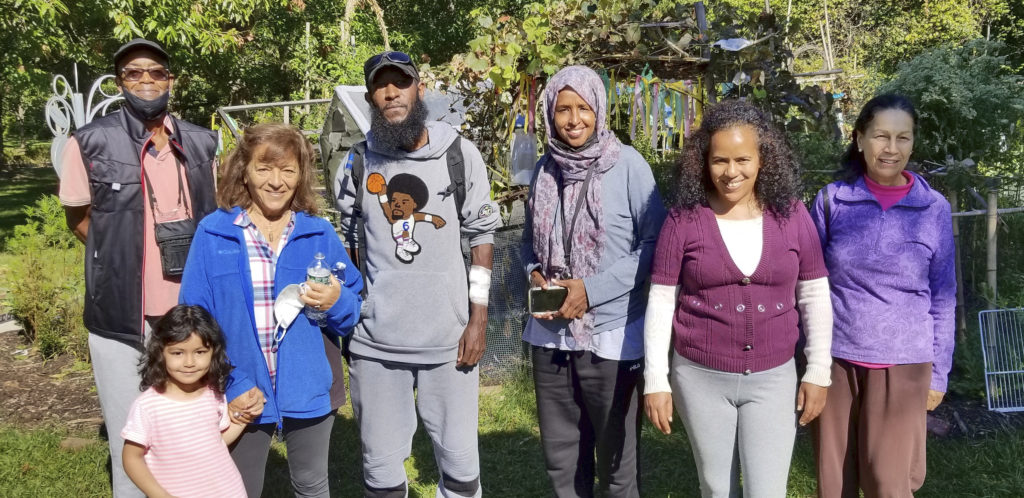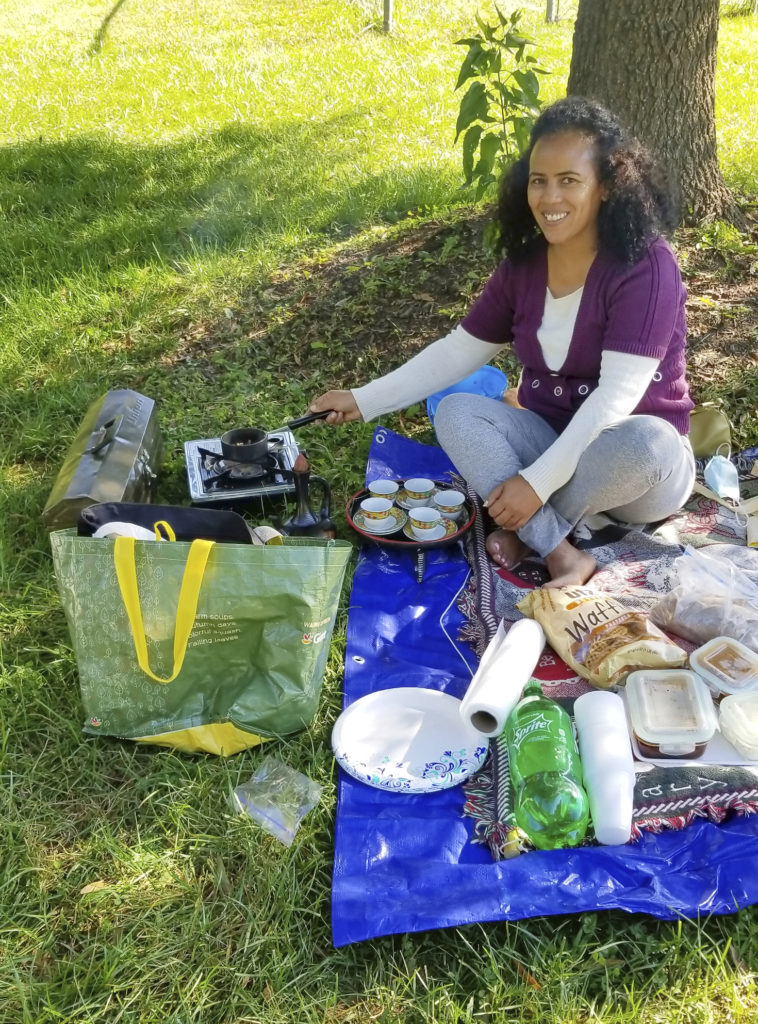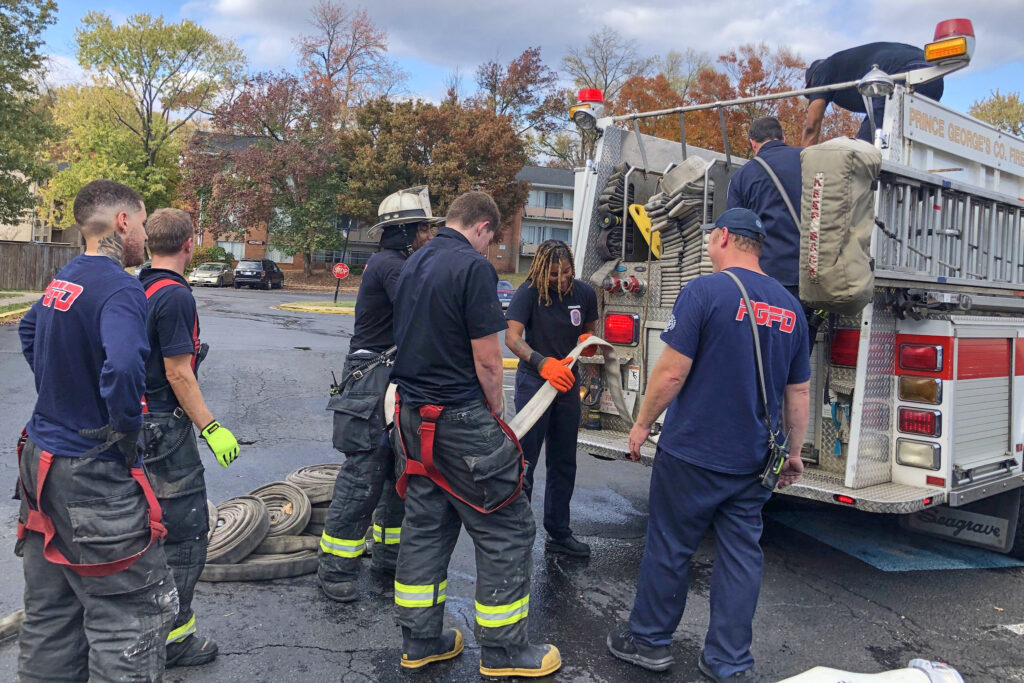The Three Sisters Garden at Schrom Hills Park on Hanover Parkway is nearing the end of its season. Volunteers who have faithfully tended the garden all summer, putting in long hours watering and weeding, now reap the harvest, including a large zucchini, attractive blue-striped green beans, carrots and mouthwatering grapes. Volunteers stagger the work over the summer coming early in the morning and staying three hours, because it takes two-and-a-half hours to thoroughly water, hauling the hose to a hookup across the field.
Around 10 volunteers gathered to celebrate, headed by Effie Levner, a charismatic leader who has inspired and personally invited volunteers to put their time into the garden. The Three Sisters Gardens around Greenbelt were started about 10 years ago by CHEARS (the Chesapeake Education, Arts and Research Society), and Levner has been working in the garden since September 2018.
Another volunteer, Francis Stedman, said, “Volunteering here is easy for me because I was always attracted to the spot. It affords me time for introspection, to design and create things, and I wanted to give back.” Sampling one of the grapes, Stedman said, “They are unusual and exquisite. To me it tastes like a wild grape. Your initial instinct is that it will be sour and then you realize, wow!” To Levner, the grapes taste like champagne.
Volunteers have decorated the place with arches and planted flowers. Poems by Rumi, Shakespeare, Robert Frost and others are hung here and there. Folks meet to talk about poetry once a month, on the third Sunday from 5 to 7 p.m.
“This garden is not just for growing vegetables. This is an inviting home, for people to come and express their feelings. People feel they can trust each other, a kind of society where people feel safe. The psychological impact of this garden is something more spiritual. People who are immigrants and feel like strangers, we try to break all these barriers. Each of us has our own story and our own background, but we can feel comfortable here,” said Levner, who was born in Tehran and lived in Israel and England before coming to America. She lives near the park.
As the morning passed, Amesale Megenasa (from Ethiopia) and Roda Abdi (from Somalia) arrived with a picnic. Megenasa spread a blanket under an oak tree, brought out a small burner and began to roast raw coffee beans in the fragrant Ethiopian coffee ceremony. She said, “We came to walk in the park, and met Effie who invited us to the garden. If you have time you can volunteer. Since that day, we have volunteered three days a week or more. We enjoyed learning and working together with so many people for the community.”
When a ripe melon disappeared, Stedman (from St. Lucia) opined, “It demonstrates that people are interested in the garden. One of the things we’ve talked about is fencing to keep out deer. We plant and nature nurtures. The birds come for the sunflower seeds, the bees come to pollinate and nature is in charge. One of the things that draws me is to interact with people from different backgrounds, but we all have a singular motive, to take care of this plot.”
Sheldon Semper (from Trinidad) pointed out a green tree frog in a hazelnut bush, where they had watched a monarch chrysalis hatch into its adult form. Two young children roamed the garden, one an Afghani girl with her mother nearby. Levner speaks Farsi to them and provided the little girl with a bicycle.
Stedman noted, “The poetry that is strategically placed around the garden grabbed me and piqued my interest.” The poem Desiderata by Max Ehrmann had been a favorite of Stedman’s since childhood. “It taught me about life, dealing with myself, and with my environment and circumstances. Here, somebody labored, somebody unknown did something that I’m benefiting from. Maybe I could be that somebody, maybe unknown – but I could contribute and make a difference. Bringing people into the garden, one person could be inspired to do what we have done. We should take time applauding Effie. I was sitting over there on the bench and she came up and invited me to the garden. She has a way about her, like a streetlight: we are moths drawn to her. She has passion and commitment. It motivates you. We are compelled when we see the amount of energy she puts into it, we become part of it and we hope that it endures.”
Volunteer Monique Johnson summed up by saying, “We are volunteers, but it’s a mini UN.”





